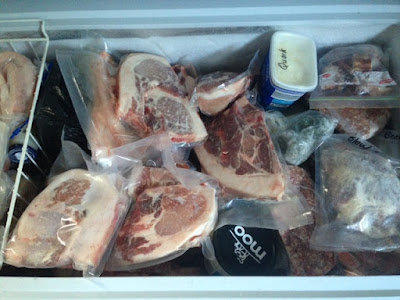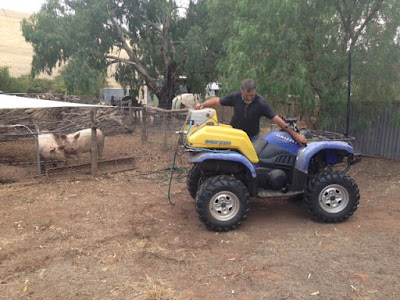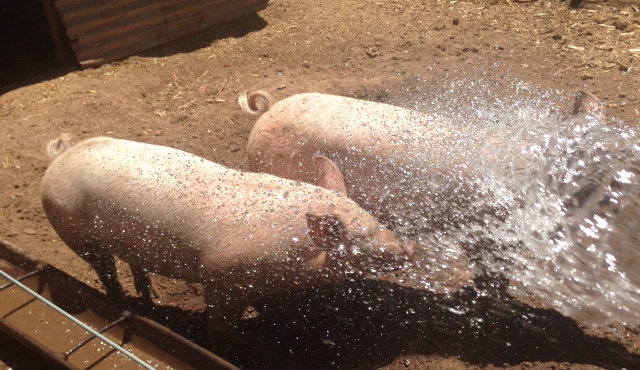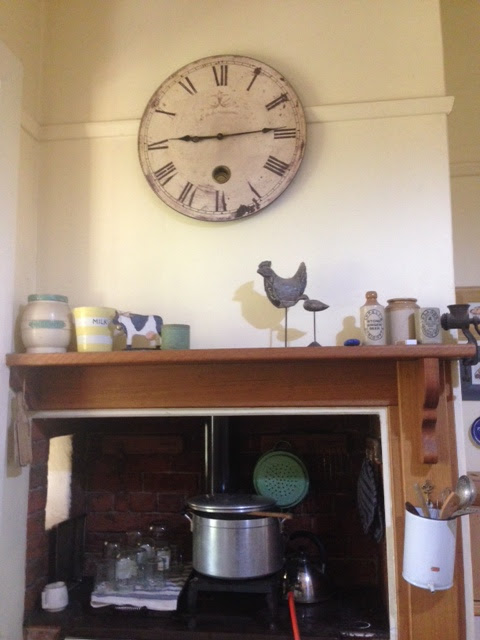I've moved around a lot and lived in different parts of Australia and the world.
Each time I moved into a house, or apartment and made it my home I started a vegetable garden.
It was the first thing I did, after unpacking the cutlery, making a bed and hanging my clothes.
My vegetable gardens took high priority because I've always felt a need to pick and eat fresh vegetables and herbs that I've grown organically.
In an apartment where no space allowed me to dig the ground I grew herbs, rocket, tomatoes and radishes in pots.
Rocket lettuce is easy and fast to grow. When I have rocket leaves I always have greens for the base of a salad and for adding to soups, stews and various cooked meals.
I still read a lot about gardeners giving advice on starting a garden and, if I didn't know what I know now, I'd be daunted before I even turned the first bit of dirt.
They talk about setting up borders, making raised beds, bringing in dirt, composted manure and on it goes. That looks like an expensive garden. Or.. that looks to hard.
Can I tell you a secret? Most of the gardens I've started were with just a spade, a watering can and some seeds.
In Kathmandu (Nepal) I used a large spoon to scrape and dig some soil near my front door. I planted pumpkin seeds, from a pumpkin I bought at the bazaar, and a tomato plant. purchased from my gardener neighbour. Both grew well and cropped heavily. My home grown vegetables were the envy of my neighbourhood.
I carried a plastic bag and occasionally on my way from work or college I picked up cow manure from the street to make liquid manure to feed my little garden. My wee bucket added more nutrient to the mix.
2004 Just moved into our farm house and co-habiting with mice and wildlife.
When Brian and I moved onto this property I started our vegetable gardens the day after we moved in.
I had a few days leave from work so I dug up some of the soil on a flat area near the house and started planting.
There were no borders, no special manures or composted soils. I just turned dirt, tossed the weeds into the wheelbarrow for the chooks, and planted seeds and seedlings.
Within a few weeks we were picking our own vegetables and herbs.
Back then this house was an almost derelict structure, and in order to afford to buy the property we had to sell all of our other properties that we owned between us. With a small mortgage that we wanted to pay off ASAP, we could not afford to rent somewhere to live so we moved in with mice scampering all night and birds flying in through the cracks in the walls. The bathroom was a makeshift structure on the verandah where we washed with a bucket while standing in a bowl.
Money was tight, we didn't even own a camera.
We both worked full time so, on weekends and evenings both of us worked together to renovate and make the house livable.
The gardens and growing our food were something that I could physically do without Brian's assistance, so if we wanted home grown vegetables it was up to me to do the work. I was nearly fifty when we came here, so was no spring chicken, and the work was hard labour, but it freed up Brian's time for working on the house, fencing stock yards and building sheds.
As our living conditions improved and we paid off the mortgage to achieve our dream of being debt free, I decreased my employment to three days a week.
After two or three years of working with our temporary vegetable gardens that were supplying a lot of our food, we began fencing areas for our permanent vegetable gardens.
These were incorporated with our poultry yards, for allowing the hens into the food gardens at the end of the growing seasons. We had a winter garden area and a separate summer garden area, with gates opening into the poultry yards to allow the hens access at varying times of the year .
I learned a lot during our first year here.
I discovered that the area I had initially planned for our permanent vegetable garden was too exposed to the wind. I'm glad I worked that out before digging all those post holes.
I learned about the changing angles of the sun during winter and summer. A spot I had chosen for the winter garden was perfect in summer but too shady in winter. That area ended up being the ideal place for the pig yards.
2018 Our comfortable and simple home.
I planted tube-stock trees along the front of the property because we were one hundred percent certain that the decision to create a privacy screen from the road would always stand to be the correct one.
As luck happened, the tree planting was followed up with our wettest three winters/springs, and the tube stock trees were taller than me within three years. I'm so glad I just got in there and planted them when I did.
I planted flowers and shrubs from cuttings from friends' gardens and the nursery 'giveaways' shelf. All over the place, I planted like a woman possessed. I kept adding straw that I collected from under the cow's hay racks, made liquid manures and was always piling organic matter and prunings onto compost heaps.
Some of those gardens remain, but others have been replaced with gravel and trees after too many years of dry summers. More gardens have been added, other gardens extended and expanded. I have plans to change some plantings this winter. The garden is always evolving.
The photo on my blog cover page shows the gardens that used to be here. Now landscaped with gravel after too many hot dry summers.
I still do most of the gardening here because I'm the one who is at home for more hours in the week, so it just makes sense that I do it. Brian manages the large vegetable garden (he says that's his relaxation), and helps me with the really heavy gardening jobs when I ask him to, but his time (when not at his full-time employment) is generally taken up with the heavy jobs involved with sheep management, fencing, building, paddock work, harvesting and property maintenance. I'm perfectly happy for him to drive the tractor, and do the heavy work while I do the work that I'm capable of.
We made this raised bed, and two others, from a salvaged water tank cut into three pieces. After the first summer I discovered how quickly the soil dried out, and they required watering twice daily! We repurposed two of them (goose nesting shelters) and only this one remains. I pile garden waste mulch into it at the end of spring and leave it unplanted over summer. Soon after the first autumn rains arrive the seeds sprout, supplying mixed greens through winter and requiring only rainfall to keep them watered.
If you're thinking of purchasing those shiny new corrugated iron raised beds from your garden supplier I would urge you to think again if you live in a hot dry environment. I've seen people throw them out or re-purpose them after their first summer.
However, if you don't mind aesthetically altering the look you wanted to achieve, they can be adapted by packing bales of hay or straw around the outer edges to provide insulation and help improve water retention.
So, if you want to grow some vegetables or plant a garden, don't over think it. Don't wait for everything to be perfect. Just find a (preferably flat) space and start digging.
For inspiration ask at your local library for "One Magic Square" by Lolo Houbein
An interesting little book, delightful in its simplicity, Ms Houbein outlines how we can begin from where we are.
Isn't that the best way to begin at anything?
Start where you are, do what you can, use what you have.
Cheers,
Sally XX









































